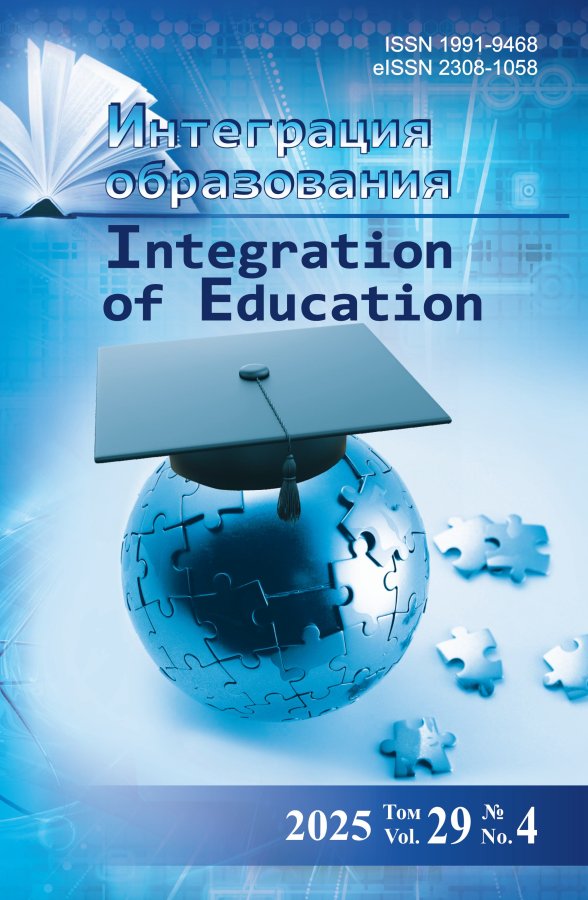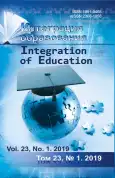Исследование ориентации на личностную модель взаимодействия с детьми как структурного компонента готовности педагогов к инклюзивному образованию
- Авторы: Сафонова Т.В.1, Сунцова А.С.2, Аслаева Р.Г.3
-
Учреждения:
- ФГБОУ ВО «Государственный университет по землеустройству»
- ФГБОУ ВО «Удмуртский государственный университет»
- ГБОУ ВО «Башкирская академия государственной службы и управления при Главе Республики Башкортостан»
- Выпуск: Том 23, № 1 (2019)
- Страницы: 50-65
- Раздел: Педагогическая психология
- Статья получена: 22.05.2025
- Статья одобрена: 22.05.2025
- Статья опубликована: 15.03.2019
- URL: https://bakhtiniada.ru/1991-9468/article/view/293014
- DOI: https://doi.org/10.15507/1991-9468.094.023.201901.050-065
- ID: 293014
Цитировать
Полный текст
Аннотация
Введение. В статье представлены результаты изучения проблемы кадрового обеспечения инклюзивного образования. Актуальность проводимого исследования определяется многочисленными затруднениями педагогов при обучении детей с особыми образовательными потребностями в условиях массовой школы. Авторы рассматривают личностно-ориентированную модель взаимодействия с детьми в качестве структурного компонента профессиональной готовности к инклюзивному образованию. Цель статьи – выявление и анализ особенностей модели взаимодействия с обучающимися у педагогов различных типов образовательных организаций.
Материалы и методы. В исследовании использован опросник В. Г. Маралова, В. А. Ситарова, позволяющий дифференцировать ориентированность педагогов на учебно-дисциплинарную либо личностно-ориентированную модель взаимодействия в образовательном процессе. Для обработки результатов исследования применялись методы непараметрической статистики (коэффициент корреляции Спирмена, тест для двух независимых выборок Манна-Уитни).
Результаты исследования. По итогам проведенного исследования выявлено, что у большинства педагогов различных типов образовательных организаций доминирует учебно-дисциплинарная модель взаимодействия с детьми, что выступает одним из факторов, препятствующих освоению педагогическим сообществом идеи и ценностей инклюзивного (адаптирующегося к особенностям ребенка) образования. Однако у педагогов инклюзивных образовательных организаций и у студентов – будущих педагогов, по сравнению с педагогами общеобразовательных и специальных учреждений, показатели личностно-ориентированной модели достоверно выше по целевым и инструментальным характеристикам деятельности.
Обсуждение и заключение. Исследование показало, с одной стороны, приверженность педагогов стереотипам авторитарной модели деятельности, а, с другой – наметившуюся тенденцию к их преодолению педагогами инклюзивных школ и студентами, что выражает стремление к личностно-профессиональному саморазвитию. Практическая значимость исследования заключена в получении новых фактов, объясняющих затруднения педагогов в освоении современной стратегии образования. Перспективы исследования заключаются в дальнейшем выявлении составляющих личностно-профессиональной готовности педагогов к инклюзивному образованию. Статья может быть интересна педагогам и специалистам, занимающимся вопросами кадрового обеспечения инклюзивного образования.
Об авторах
Татьяна Витальевна Сафонова
ФГБОУ ВО «Государственный университет по землеустройству»
Автор, ответственный за переписку.
Email: safonova1956@mail.ru
ORCID iD: 0000-0001-8871-2069
ResearcherId: B-1751-2019
профессор кафедры социально-гуманитарных дисциплин, доктор педагогических наук
Россия, 105064, Москва, ул. Казакова, д. 15Александра Сергеевна Сунцова
ФГБОУ ВО «Удмуртский государственный университет»
Email: st.ped@mail.ru
ORCID iD: 0000-0003-3817-4762
ResearcherId: B-1640-2019
доцент кафедры педагогики и педагогической психологии, кандидат педагогических наук
Россия, 426034, Ижевск, ул. Университетская, д. 1Рахима Гильметдиновна Аслаева
ГБОУ ВО «Башкирская академия государственной службы и управления при Главе Республики Башкортостан»
Email: rakhima.aslaeva@mail.ru
ORCID iD: 0000-0001-7455-7854
ResearcherId: B-2259-2019
профессор кафедры дополнительного профессионального образования, доктор педагогических наук
Россия, 450000, Уфа, ул. Заки Валиди, д. 40Список литературы
- Ряписова А. Г. Инклюзивное образование как системная инновация // Вестник Новосибирского государственного университета. 2017. Т. 7, № 1. С. 7–20. doi: 10.15293/2226-3365.1701.01
- Хуснутдинова М. Р. Риски инклюзивного образования // Образование и наука. 2017. Т. 19, № 3. С. 26–46. doi: 10.17853/1994-5639-2017-3-26-46
- Модельный образец специальных образовательных условий для получения высшего образования студентами с инвалидностью: опыт создания и применения / В. В. Рубцов [и др.] // Психологическая наука и образование. 2017. Т. 22, № 1. С. 34–49. doi: 10.17759/pse.2017220106
- Горюнова Л. В. Особенности магистерской подготовки педагогических кадров к организации в системе инклюзивного образования социокультурной анимации, реабилитации, абилитации обучающихся с инвалидностью // Гуманитарные науки. 2017. № 2 (38). С. 169–174. URL: https://clck.ru/F3w88 (дата обращения: 17.03.2018).
- Севрюкова А. А., Фазылова М. Ф. Внутриорганизационное обучение педагогов школы для осуществления инклюзивного образования // Научное обеспечение системы повышения квалификации кадров. 2017. № 1 (30). С. 5–13. URL: http://ipk74.ru/upload/documents/jornal30.pdf (дата обращения: 17.03.2018).
- Personality Traits of Expert Teachers of Students with Ebd: Clarifying a Teacher’s X-Factor / B. Svenja [et al.] // International Journal of Inclusive Education. 2016. Vol. 20, Issue 6. Pp. 569–587. doi: 10.1080/13603116.2015.1100222
- Айбазова М. Ю., Лавринец К. Ю. Подготовка будущих учителей к работе в условиях инклюзивного образования // Педагогика. 2014. № 5. С. 82–86. URL: http://pedagogika-rao.ru/journals/2014/06 (дата обращения: 17.03.2018).
- Transformative Pathways: Inclusive Pedagogies in Teacher Education / H. Gudjonsdottir [et al.] // Journal of Research on Technology in Education. 2007. Vol. 40, Issue 2. Pp. 165–182. doi: 10.1080/15391523.2007.10782503
- Timo S. How Common are Inclusive Educational Practices Among Finnish Teachers? // International Journal of Inclusive Education. 2018. Vol. 22, Issue 5. Pp. 560–575. doi: 10.1080/13603116.2017.1390001
- Костенко Е. П., Лебединцева О. И. Современные подходы к анализу понятия «профессиональная готовность» // Акмеология. 2017. № 4. С. 30–33. URL: http://acmeology.elpub.ru/jour/article/view/1269/603 (дата обращения: 19.03.2018).
- Герасименко Ю. А. Профессионально-личностная готовность педагога к работе в условиях инклюзивного образования // Педагогическое образование в России. 2015. № 6. С. 145–150. URL: http://journals.uspu.ru/attachments/article/932/25.pdf (дата обращения: 18.03.2018).
- Яковлева И. М. Профессионально-личностная готовность педагога к работе с детьми с ограниченными возможностями здоровья // Вестник Московского государственного областного университета. 2009. № 4. С. 140–144. URL: http://vestnik-mgou.ru/articles/doc/2005 (дата обращения: 15.03.2018).
- Biktagirova G. F., Khitryuk V. V. Formation of Future Pre-School Teachers Readiness to Work in the Conditions of Educational Inclusion // International Journal of Environmental & Science Education. 2016. Vol. 11, Issue 3. Pp. 185–194. doi: 10.12973/ijese.2016.302a
- Алехина С. В. Инклюзивное образование: от политики к практике // Психологическая наука и образование. 2016. Т. 21, № 1. С. 136–145. doi: 10.17759/pse.2016210112
- Hosford S., O’Sullivan S. A Climate for Self-Efficacy: The Relationship Between School Climate and Teacher Efficacy for Inclusion // International Journal of Inclusive Education. 2016. Vol. 20, Issue 6. Pp. 604–621. doi: 10.1080/13603116.2015.1102339
- Хитрюк В. В. Формирование инклюзивной готовности будущих педагогов: результативность дидактической модели // Вестник Балтийского Федерального университета им И. Канта. Сер.: Филология, педагогика, психология. 2015. Вып. 5. С. 112–120. URL: https://journals.kantiana.ru/vestnik/3002/8414 (дата обращения: 15.03.2018).
- Florian L., Linklater H. Preparing Teachers for Inclusive Education: Using Inclusive Pedagogy to Enhance Teaching and Learning for All // Cambridge Journal of Education. 2010. Vol. 40, Issue 4. Pp. 369–386. doi: 10.1080/0305764X.2010.526588
- Florian L. Inclusive Pedagogy: A Transformative Approach to Individual Differences but Can it Help Reduce Educational Inequalities? // Scottish Educational Review. 2015. Vol. 47, No. 1. Pp. 5–14. URL: https://eric.ed.gov/?id=EJ1093085 (дата обращения: 22.03.2018).
- Acedo C. Preparing Teachers for Inclusive Education // Prospects. 2011. Vol. 41. P. 301. doi: 10.1007/s11125-011-9198-2
- Taruq A. M. Challenges of Inclusive Educational Reforms in Asian Countries // Asian Journal of Inclusive Education. 2017. Vol. 5, № 1. Pp. 1–4. URL: http://ajie-bd.net/journal_year/july-2017 (дата обращения: 18.03.2018).
- Kaur A., Noman M., Awang-Hashim R. Exploring Strategies of Teaching and Classroom Practices in Response to Challenges of Inclusion in a Thai School: A Case Study // International Journal of Inclusive Education. 2016. Vol. 20, Issue 5. Pp. 474–485. doi: 10.1080/13603116.2015.1090489
- Sagner-Tapia J. An Analysis of Alterity in Teachers’ Inclusive Pedagogical Practices // International Journal of Inclusive Education. 2017. Vol. 22, Issue 4. Pp. 375–390. doi: 10.1080/13603116.2017.1370735
- Sсhlessinger S. Reclaiming Teacher Intellectualism Through and for Inclusive Education // International Journal of Inclusive Education. 2018. Vol. 22, Issue 3. Pp. 268–284. doi: 10.1080/13603116.2017.1362598
- Sutton K. Nontraditional Pre-Service Teachers: What They Learn from Inclusion Literature [Электронный ресурс] // Electronic Journal for Inclusive Education. 2015. Vol. 3, No. 4. URL: http://corescholar.libraries.wright.edu/ejie (дата обращения: 24.03.2018).
- Деркач А. А. Профессиональная субъектность как психолого-акмеологический феномен // Акмеология. 2016. № 1. С. 8–13. URL: http://acmeology.elpub.ru/jour/article/view/892/261 (дата обращения: 19.03.2018).
- Структурная модель личностно-профессионального саморазвития будущих специалистов / Ж. Г. Гаранина [и др.] // Интеграция образования. 2017. Т. 21, № 4. С. 596–608. doi: 10.15507/19919468.089.021.201704.596-608
- Маралов В. Г. Приобретение или избавление: проблема выбора студентами стратегий самосовершенствования // Интеграция образования. 2017. Т. 21, № 3. С. 477–488. doi: 10.15507/19919468.088.021.201703.477-488
- К вопросу об интерактивных технологиях обучения студентов в вузе / Т. В. Сафонова [и др.] // Бизнес. Образование. Право. Вестник Волгоградского института бизнеса. 2018. № 1 (42). С. 263–266. URL: http://vestnik.volbi.ru/upload/numbers/142/article-142-2063.pdf (дата обращения: 26.03.2018).
- Confronting Similar Challenges? Disabled and Non-Disabled Students Learning and Assessment Experiences / M. Madriaga [et al.] // Studies in Higher Education. 2010. Vol. 35, Issue 6. Pp. 647–658. doi: 10.1080/03075070903222633
- Martius H. M., Borges M. L., Concalves T. Attitudes Towards Inclusion in Higher Educational in a Portuguese University // International Journal of Enclusive Education. 2018. Vol. 22, Issue 5. Pp. 527–542. doi: 10.1080/13603116.2017.1377299
- Кадровый потенциал как основной фактор успешной реализации инклюзивной системы образования / Л. А. Шкутина [и др.] // Вестник Новосибирского государственного педагогического университета. 2017. Т. 7, № 1. С. 21–33. doi: 10.15293/2226-3365.1701.02
- Timor T. Attitudes of Beginner Teachers of Special Education to Classroom Management: Who`S the Boss Here? [Электронный ресурс] // Electronic Journal for Inclusive Education. 2011. Vol. 2, No. 7. URL: https://corescholar.libraries.wright.edu/ejie/vol2/iss7/2 (дата обращения: 19.03.2018).
Дополнительные файлы











